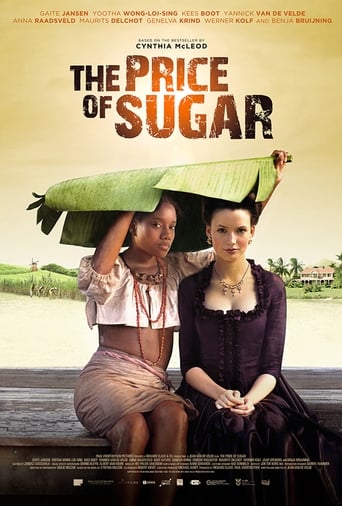Kirpianuscus
a historical drama. not better or worst by many others. its virtue - to remember a page from the Modern history of Netherlands. its sin - the too obvious feminist manifesto message. and the desire to explore a too large field of problems, proposing , not always, the best solutions. the seductive parts are the same from the other historical dramas giving stories from territories overseas. the mixture of exoticism and clash between cultures and Manichean portraits. the last thing is the source of "like too many others" as conclusion about this series. because, in fact, only bad thing in this case is the difference between a generous subject and the easy story , pink and real too sentimental, ignoring the rules proposed in the first part for the end "ad usum Delphini". but it is a nice film. and this could be the only significant thing about it.
Andres Salama
The plot of this movie sounds interesting, at least because it's about an era not often portrayed on films: it's the late 18th century, and we are in the Dutch colony of Suriname, where Dutch colonists live in luxury on their sugar plantations along their long suffering African slaves. Just outside the plantations, in the jungle, are the maroons (escaped slaves) resisting the Dutch. The girls in the plantations are oblivious to this or to the exploitation of the slaves and play their silly games of love. Sarith (Gaite Jansen, overacting) is the most beautiful girl in the colony. Mini- Me (Yootha Wong Loi Sing) is her personal slave and also her half sister. In the end, the movie is a bit long, and Sarith antics end up being tiresome. Note: apparently this was a Dutch miniseries (I guess this is more bearable to watch in shorter segments) while I watched a 120 minute version.
imizrahi2002
pardon the pun, but i felt this movie was a little too sugar-coated...it DID represent situations that were 'realistic'/violent...but, overall, it felt like a bit of Hollywood fluff...happy/no loose ends ending and all... i'm only writing this review b/c a)there's only one other(all that was REALLY necessary, imo)review and b)i wanted people to have a better feel for whether or not to see it. again, the other reviewer covered it pretty well...some scenic photography...a bit of what plantation life might've been like in, what is now, suriname... i'm an 'american transplant' now taken root in Holland/nederland. i already know of this aspect of dutch history, if it can be so called. for, to me, it's of course part of suriname history which the dutch happened to play a part in. let's face it, suriname was there before the dutch arrived so i hope to see no insulted responses to this comment. same as 'america'. it existed, along with the indigenous peoples, before the white man ever arrived... the movie is pleasant, if that's what you're looking for. well done but does not 'dive deep'. which is where pearls are found, no?
Poppy Hill
"Hoe Duur Was De Suiker" offers a peek into a dark part of Dutch history; it is the 18th century in Surinam, former colony of the Netherlands, where wealthy white families keep black slaves to work in their houses or on their fields. Little rich girl Sarith grows up in luxury, with her own slave Mini-Mini by her side. As Sarith and Mini-Mini grow older, their different societal positions as slave-owner and slave is what both binds and separates them.This film could have been a great way to make Dutch audiences aware about the history of slavery and move them with the main storyline. Although the scenery, decor and costumes are beautiful and credible, the plot, script and acting is anything but convincing. The shallow storyline makes it hard for the viewer to relate to the main characters and the overall story. This also has to do with flimsy lines and bad acting (especially Gaite Jansen) - which sometimes looked surprisingly clumsy in comparison to the detailed and polished backgrounds. Unfortunately, this film fails to convince and to move, and thereby misses a great opportunity to produce a film worthy of incorporating into Dutch film canon.



